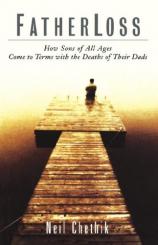Fatherloss: How Sons of All Ages Come to Terms With the Deaths of Their Dads
Review
Fatherloss: How Sons of All Ages Come to Terms With the Deaths of Their Dads
A large body of work exists for women and children on dealing with
the death of a parent, but there hasn't been much for men. With
FATHERLOSS we have a timely work on how men grieve after their
fathers die.
When one of Neil Chethik's columns in his syndicated
VoiceMale drew an overwhelming response, he decided to
research the impact the death of a father has on a son. He states
that sons lose their fathers at the rate of 1.5 million times a
year, yet we know so little about how this loss affects them. For
the next several years, Chethik conducted in-depth interviews with
more than 70 men and did extensive telephone surveys with 376 men
under the advisement of Dr. Robert Kastenbaum, a bereavement
specialist at the University of Arizona. The result is
FATHERLOSS.
The death of a parent, even when expected, always comes as a
surprise. In our society it has always been understood that women
grieve more openly than men. However,that is not to say that men
and boys feel the loss any less. As the result of Chethik's
interviews, men are allowed to speak of the pain and turmoil they
felt, often for years, after the death of their fathers. Chethik
distills how sons at different ages handle this; some men who lost
their fathers at very early ages felt their lives take a turn for
the worse.
Throughout FATHERLOSS, there are stunning portraits of how world
famous men, known for their strength and stoicism, have dealt with
the deaths of their fathers. For example, Chethik writes of Michael
Jordan's retirement from basketball and subsequent switch to a
short career in baseball after the sudden death of his father. He
recounts Ernest Hemingway's references in letters and short stories
of his own father's death by suicide. We learn of the pain John
Quincy Adams felt when entering his father's bedroom after his
death and how, after his term in office as president ended, he was
elected to the House of Representatives instead of retiring as he
had planned --- his father's death inspired him to continue his
work in the antislavery campaign.
Without a doubt, one of the best pieces of advice Chethik offers to
fathers is for them to tell their sons and daughters that they love
them unconditionally. Those three words, "I love you," are the
words that men too frequently miss hearing from their fathers.
FATHERLOSS is one of the most readable and sensitive books on the
subject of how boys and men approach the death of their fathers.
Included are several important appendices: the survey Chethik used
in his research, a list of organizations dealing with death, and a
comprehensive list of films about fathers and their children.
An important addition to the collection of books on coping with
grief and bereavement, FATHERLOSS fills an empty spot on the shelf.
I strongly encourage both men and women to experience Neil
Chethik's insightful wisdom in FATHERLOSS. The lack of fluffy,
feel-good psychobabble is refreshing.
Neil Chethik is a writer and journalist on the psychological
characteristics of men. From 1992 to 1996, his popular syndicated
column, VoiceMale, appeared in 35 newspapers. He is a
motivational and workshop speaker and lives in Kentucky.
Reviewed by Mary Louise Rohner on January 21, 2011
Fatherloss: How Sons of All Ages Come to Terms With the Deaths of Their Dads
- Publication Date: January 10, 2001
- Genres: Nonfiction
- Hardcover: 320 pages
- Publisher: Hyperion
- ISBN-10: 0786865326
- ISBN-13: 9780786865321



